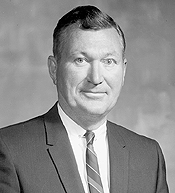Opinion: Memories of Transport Topic’s Bill Odlin
|
It was 31 years and two months ago when Bill invited me to Washington to interview for a job as associate editor of TT. He graciously rose from his desk, greeted me warmly, spoke at length about what the job entailed — and even kindly showed me around the building.
 |  |
 | William S. Odlin Jr. |
I was thinking he would let me know, at some later time, how I stood in the chances of getting the job. Suddenly, without realizing just how carefully Bill had been scrutinizing me, to my utter astonishment, he said, “Well, will you take the job?”
I was shocked, but quickly said yes, and thanked Bill. I’ve always remembered his kindhearted way of putting me at ease that day in August 1968, and how he treated me with far more respect than I probably deserved.
That was Bill Odlin — affable, generous, caring and considerate — the last of a dying breed, a bona fide gentleman of the old school.
After beginning work, I came to find out just how benevolent and empathetic he truly was. With house prices what they are in Washington, I had trouble finding one I could afford. So I rented a small room. That meant an eight-hour drive home on weekends to visit my family.
When Bill found out, his charitable spirit once again radiated: He started letting me knock off early every Friday so I could get a head start on traffic. Sometimes, he let me leave as early as noon or 1 p.m.
He didn’t have to do that, but he did — and it’s not the sort of thing one soon forgets. I can still see him, these 31 years later as if it were only 31 seconds ago, rising out of his chair, coming to the door and giving me the high sign to make a quiet exit for my 500-mile drive.
Bill Odlin possessed the rare insight and true talent of a genuine newsman. He knew what was news, and what was not — without having to check with someone or follow the herd, unlike many of today’s TV journalists, whose main talent consists of blow-dried hair and blow-hard voices.
After I had been at TT but a short time, I handed Bill a short story from the wire service, and suggested it might make a good “Trucking Ahead” piece. I’ll never forget how he looked intently at the piece, with the wheels in his mind turning.
“No,” he said firmly, “it’s worth more than that.”
He sent me digging into the matter on Capitol Hill, and the “short” story wound up as an explosive, five-part series that exposed a “canned editorial factory,” which churned out editorial pieces sent to newspapers across the country.
Many newspapers ran the phony editorials — which always found a way to praise railroads while criticizing trucks — without ever knowing that the subterfuge outfit was highly subsidized by railroads to do their dirty, undercover work against trucks.
But Bill’s keen news insight revealed it all. As I labored over the raw information, he fed me — from memory — exhaustive, detailed information about the matter, which proved invaluable in marvelously fleshing out the expose, which was reprinted in the Congressional Record.
Once again, Bill Odlin’s news genius gleamed with magnificence.
Even though I am tremendously saddened by his death, in a real sense, Bill is not dead at all. He still lives through the warm memories he generated. Those memories can never be taken away by death, or cheated by the grave, or stolen by the tomb.
Bill’s death — and his life — remind me of an old backwoods Alabama pond where I learned to swim some 55 years ago. A while back, when I went home to recapture those memories, I could not even find the pool. With the changed landscape and a new highway, it was gone — vanished forever.
Until I closed my eyes, and there it was, as plain and vivid as it was when I swam there.
Unlike that old swimming hole, my majestic memories of Bill Odlin won’t dry up or disappear.
When I spoke with Bill a few days before his final hospitalization, and he knew the end was near, he said he wanted to die with dignity. You did, old friend, you did.


